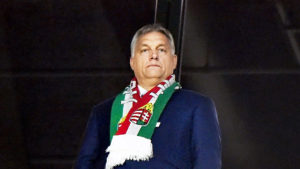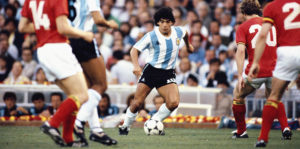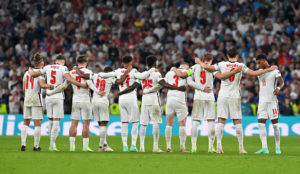James Maddison in. Ben White and Marcus Rashford restored. Kalvin Phillips and Kyle Walker risked despite injury. As the England squad was announced yesterday, the familiar excitement began to kindle. Even if the reported viewing figure for the 2018 final of 3.572 billion appears to have been exaggerated, the World Cup is one of the few truly global events. The opening game is Qatar against Ecuador, and their group is completed by Senegal and the Netherlands: it’s hard to imagine many other spheres in which four such disparate countries compete on such a stage.
And yet, it’s impossible not to approach Qatar with a sense of unease. This is the first World Cup since 1934 to be hosted by a nation that has not previously played in it; why is Qatar so keen to be involved that it has spent an estimated $220 billion on staging the event?
The answer is timeless: hosting the World Cup has always been a political act. When Uruguay staged the first tournament in 1930, Juan Campisteguy’s government underwrote the costs of travelling teams because it believed the tournament would promote the country’s centenary of independence. The gamble paid off; Uruguay went on to beat Argentina 4-2 in the final.
This was nothing compared to what happened in Italy four years later. Mussolini was well-aware of the propagandistic potential of sport, often being photographed riding a horse or skiing. In 1933, when he met Engelbert Dollfuss at the beach resort of Riccione, he donned a pair of swimming trunks while the diminutive Austrian Chancellor wore a sober suit. “When you compete abroad,” Mussolini told Italian athletes, “the honour and sporting principle of the nation is entrusted to your muscles and above all your spirit.”
No doubt the Antwerp Olympics of 1920 were at the back of his mind, when the Italian athletes who turned up were a dishevelled bunch who sang the “Red Flag”. Twelve years later, they arrived in Los Angeles dressed in matching black shirts and singing “Giovinezza”, the hymn of the Italian Fascist Party. They went on to finish second in the medals table. Victories abroad, as Il Littorale noted as early as 1928, “were clear signs of racial superiority that are destined to reflect in many fields outside of sport”.
Whether Italy’s football coach throughout the Thirties, Vittorio Pozzo, was a Fascist remains contested, but he certainly benefited from the regime’s focus on muscular leadership. “The norms that govern the game,” he said, “impose the principles of authority, without which order cannot exist.” His side at the 1934 World Cup was brisk and physical and found referees benevolent. As the journalist Gianni Brera observed in his great history of Italian football, Louis Baert, the Belgian who oversaw the quarter-final against Spain, “behaved as if he were well-aware where the game was taking place”, while there were numerous rumours about meetings between Mussolini and the Swedish referee Ivan Eklind, who unusually refereed both Italy’s semi-final and the final.
Not that anybody in Italy much cared about the controversies, as Simon Martin’s Football and Fascism makes clear. In La Gazzetta della Sport, Bruno Roghi wrote of the national team as “little, gallant soldiers who fight for an idea that is greater than them”, while the Florentine Fascist weekly Il Bargello described the World Cup win as “the affirmation of an entire people, an indication of its virile and moral strength”.
It wasn’t, though, just about winning the World Cup. It was also about projecting the idea of Italy as a modern nation. There had been heavy investment in stadiums for a decade before the tournament. Fans from France, Germany, the Netherlands and Switzerland were subsidised to come to Italy. Tickets were printed on high-quality paper to encourage visitors to keep them, and the Fascist insignia they bore, as souvenirs. The Futurist artist Filippo Marinetti was commissioned to design a poster that focused on a powerful, thrusting figure in Italian kit and bore the fasces in one corner. Stamps produced for the tournament pursued a similar theme.
Foreign journalists were impressed, to the delight of the Italian media. “The spontaneous and heartfelt statements of our foreign colleagues,” Roghi wrote in La Gazzetta, “are more than sufficient to show Mussolini’s Italy — that was once little Italy of all improvisations and apologies — has organised the festival of football with the style, flexibility, precision, even the courtesy and meticulousness that indicated an absolute maturity and preparedness.” His response was extreme but not uncommon. It was a similar eagerness to show off the Estado Novo that led the Getúlio Vargas regime to bid for Brazil to host the 1942 World Cup — although by the time that tournament was finally played, in 1950, Vargas had been deposed.
Argentina was chosen as host for the 1978 tournament in 1966, the bid of one military junta ultimately inherited by another. This political chaos was reflected in the official logo, which was based on the arms-clasped-above-head gesture of Juan Perón, who had briefly returned to power in 1973 before dying and being succeeded by his wife, Isabel, who was ousted three years later in a coup. Before the tournament was held, slums were destroyed or hidden from view, dissidents rounded up, and around a tenth of the national budget spent on constructing or redeveloping stadiums. Most important: Argentina won.
Whether, as is widely believed, the success sustained the junta in power is difficult to assess, but two details seem telling. First, about ten minutes’ walk from El Monumental, the stadium where Argentina beat the Netherlands in the final, is the ESMA (the Navy School of Mechanics) which, under the junta, became a notorious torture centre. When the prisoners, hearing the roars of the crowd, celebrated in the cells, General Jorge Acosta, one of the most brutal torturers, took out three of them in his car and wound down the windows so they could see the celebrations on the streets — to show them that their protests against the regime meant nothing beside the eruption of patriotic joy. Second, four years later, after the invasion of the Falklands, Argentinian TV broadcasts were dominated by two things: news from the war, and reruns of the glory of ‘78.
Qatar, then, is not unique. Every country to have hosted the World Cup has done so with some sort of soft-power objective in mind. Even England, in 1966, saw their triumph blend with the idea of Swinging London: to project an image of a vibrant, modern nation emerging from the gloom and stuffiness of the Fifties and the loss of influence both politically and in football (the 6-3 defeat to Hungary in 1953 was essentially football’s Suez).
But this World Cup does feel different. This is partly down to the corruption that surrounded the award of hosting rights for 2018 and 2022. There is no evidence Qatar did anything wrong, but 16 of the 22 delegates who made the decision have either been convicted or credibly accused of wrongdoing, while many have wondered what was discussed at the lunch, nine days before the vote, between Nicolas Sarkozy, the then-French president, Tamim al-Thani, who has since succeeded his father as Emir of Qatar, and the French then-Uefa president, Michel Platini.
Then there are the well-reported human rights issues, and the fact that, ever since the Gulf states bought up major football clubs and the rights to stage major fights and Formula One races, both the British media and fans are more aware than ever about “sportswashing” — the way sport can be used to present a certain picture of a nation and garner influence. The phenomenon of certain fans backing the stance of the state that owns their club against its critics — see Newcastle fans criticising the fiancée of the murdered Saudi journalist Jamal Khashoggi; or Manchester City fans insisting on the guilt of Matthew Hedges, who was accused of spying in Abu Dhabi — was familiar even before news broke that Qatar is actively paying fans from certain countries to sing on demand and help police social media.
Meanwhile, for those fans who do stay home, there is a prospect of a winter sitting huddled under blankets, struggling to afford rising energy prices (caused by a war started by the last World Cup hosts), hoping the power cut is over in time to watch the next game, beamed live from a country that is only staging the tournament because of the profits it has made from selling gas. Geopolitics has a sudden immediacy.
The Fifa president Gianni Infantino and secretary general Fatma Samoura wrote this month to each of the 32 competing football federations, urging them not to allow “football to be dragged into every ideological or political battle that exists”. Which is not, on the face of it, unreasonable — were it not for the fact that Qatar hosting a World Cup is itself part of a political battle, and that certain issues cannot be casually dismissed as differences of ideology. The letter speaks of the opportunity “to welcome and embrace everyone, regardless of origin, background, religion, gender, sexual orientation or nationality” — and yet homosexuality is outlawed in Qatar. An existential threat to a group of people is not “an ideological or political battle”; indeed, it runs directly contrary to Article 3 of Fifa’s own statutes, the value of which is now exposed as nil.
Finally, there is the decision not to hold the World Cup in June-July. Perhaps there is a case to be made that the European off-season should not dictate the timing of the World Cup. Why should a raft of countries be disbarred from hosting just because their climate does not fit? But this does not alter the realisation that the bidding process for 2022 was for a tournament to be staged in June and July, and that the rules were changed after Qatar had won when it was decided that maybe trying to play — or watch — football in 40-plus degrees wasn’t a great idea, even with whatever speculative cooling technology was being proposed.
Covid-related changes to the schedule also have not helped, but the rejig to the Premier League calendar necessitated by the November start means there are just seven days between the final domestic league game and the opening match of the World Cup. There should have been eight, but three months ago the start date was suddenly moved forward by a day, apparently so Qatar could play Ecuador with the eyes of the world upon them, undistracted by three other matches on the same day. The change was made just as a global advertising campaign was launched marking 100 days till the start of the World Cup and immediately rendered inaccurate — the problem perhaps of a society in which royal whim can override years of diligent planning.
To put the lack of break in context, there has never previously been fewer than 16 days between the Champions League final and the first game of the World Cup, so most players have had three-to-four weeks beforehand. This means not only a greater likelihood of fatigue and injury for players, but also a lack of preparation time for national coaches; with the usual two-to-three weeks of build-up reduced to three or four days, how can they work on anything but the most basic planning?
There will be those who question how much this all matters. Football, after all, is only a game. It is just 22 players chasing around an inflated polyurethane sphere. Compared to persecuted minorities and workers toiling in abject conditions, who cares about the football? But the World Cup does matter. It matters to those who play it and those who watch it and those who believe, along with Jules Rimet, that, despite it all, the tournament can be an event that fosters understanding between peoples. And yet, once again, perhaps more than ever, the World Cup finds itself a tool of propaganda, with all that is good about it sublimated to the needs of an authoritarian state. At its heart, the World Cup is an idealistic phenomenon, and those ideals have rarely felt so threatened.
Disclaimer
Some of the posts we share are controversial and we do not necessarily agree with them in the whole extend. Sometimes we agree with the content or part of it but we do not agree with the narration or language. Nevertheless we find them somehow interesting, valuable and/or informative or we share them, because we strongly believe in freedom of speech, free press and journalism. We strongly encourage you to have a critical approach to all the content, do your own research and analysis to build your own opinion.
We would be glad to have your feedback.
Source: UnHerd Read the original article here: https://unherd.com/





